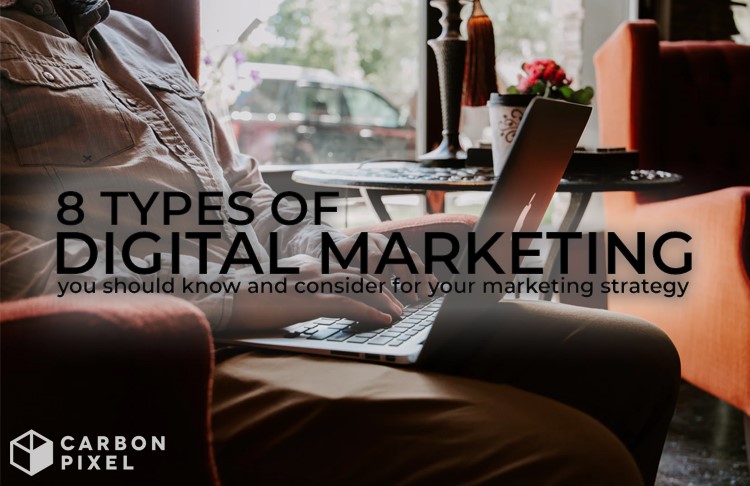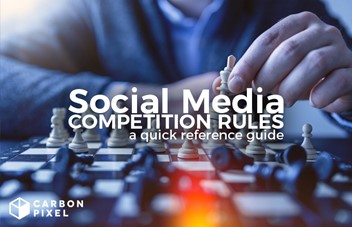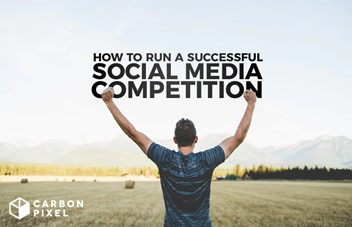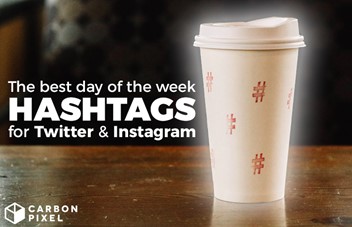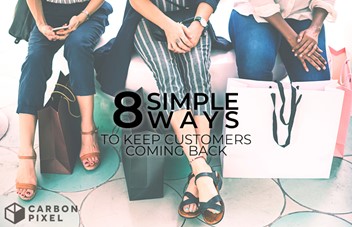As a Digital agency, we are often asked "What actually is Digital Marketing?" by many of our clients. Simply put Digital Marketing is the promotion of products and/or brands through one or more forms of electronic media, such as email and Social Media. It differs from traditional marketing in that it uses multiple channels and methods that enable a business to analyze campaigns and understand what is working and what isn't.
To give you an even better understanding of what Digital Marketing is, here are 8 forms of marketing (that fall under the term "Digital Marketing") that you should be using as part of your everyday marketing strategy.
1) Social Media Marketing
Social Media Marketing has probably become one of the most powerful things on this list, because of the potential of it.
Social Media Marketing is the use of social media platforms, like Facebook or twitter to promote a product, service or a brand.
That means sharing and creating content with followers, fans, partners, competitors, aka - your audience across social channels, with the goal to increase engagement, followers and ultimately sales. In essence, Social Media Marketing is the targeted use of an audience to create conversations to increase awareness of a particular product or service.
But you do need to be careful, to be successful with your social media marketing you need to have a great understanding of social media and what it can offer. For example, you need to fully understand what social media channels apply to your business. You wouldn't sit and push your products on LinkedIn if you are a business that sells family-related products because it just wouldn't work effectively.
Today, almost all marketing strategies utilise Social Media in one way or another. Whether that's using Social Media as a way to enter a competition or simply using Social Media to gather feedback on a service or product. The possibilities are truly endless.
By ensuring Social Media is part of your marketing strategy, you'll see bigger & better results across your campaigns and you'll improve your brand loyalty and awareness.
2) Content Marketing
Content Marketing is the form of using story-telling and valuable information to increase brand awareness and to promote a product or service, with the end-goal of getting your audience to take an action that's profitable.
Content Marketing aims to build relationships between your business and your customers, becoming a partner rather than an advertiser. That means that Content Marketing is often used in inbound marketing strategies through a content strategy that fully focuses on giving the target audience value through informative, engaging and interesting content.


Image Source: Content Marketing Institue
3) Email Marketing
Email Marketing has quickly become one of the best converting marketing channels. By keeping your email subscribers regularly updated you build and nurture a relationship with them. They get used to hearing from your business regularly and start to get in the habit of looking out for your emails. What's even better, is by providing value with email updates you can build trust. All these combined eventually lead to turning a profit.
Email Marketing isn't simple though, there are a lot of policies that you have to adhere to, and you also have to consider every marketer's best friend GDPR. Ensure you have permission to email someone marketing material, make sure you stick to a set day of the week or month to email someone and never send them unsolicited mail. It could land you in trouble which will be far more damaging to you and your brand. Also, if someone offers you "GDPR Compliant third-party data" reject it, we'll get onto that now.
You'll always see the best results from email marketing from those people whom you have personally earned. IE Those who have signed up to hear more from you. Those who subscribe to your brand want to know more, they want to see your emails and they want your deals. By subscribing they are telling you they are interested in your brand. Never blind email, that means never email people who have not signed up to hear from your brand, don't invest in third-party data. It increased your costs and negatively impacts the results for campaigns.
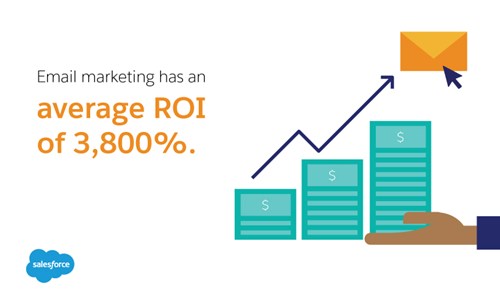
Image Source: Salesforce
An email list that has been built up of people who have taken the steps to subscribe to you will turn into your best digital marketing asset and an email campaign can and will drive sales. So make sure you include Email Marketing in your marketing strategy. A good place to start is a monthly newsletter.
4) Search Engine Optimisation (SEO)
SEO is the process of optimising websites and content so they show up on search engines, like Google & Bing. Search Engines are like school bullies, the mean girls of the playing field if you will. Search Engines decide which websites to show and in what order based on the keywords entered by a person searching. You need to make sure your content and website are fully optimised else Search Engines won't ever display your website or content, meaning you'll never rank and won't ever get found by potential customers in your local area. You'll kind of be like that Kid that everyone ignores on the playground. But, it's not just about keywords, your website needs to be easy to use too.
That means SEO has a lot to do with using the right keywords, keyphrases and usability. Search Engines rank you on so many factors, so make sure whatever you're putting online is fully optimised for SEO.


Image Source: Neil Patel
SEO should always be the number one on any marketing strategy you do, if you don't fully understand SEO though, we don't recommend attempting to optimise anything because you could do more damage than good. We're always on hand to help with tips & tricks and can even come in and train you on all things SEO so you see positive results, not negative.
5) Search Engine Marketing (SEM)
Whilst SEO is the process of getting unpaid traffic to your website, SEM is the opposite where you aim to get paid traffic to your website from search engines. The most common form of SEM is Google Adwords, for the simple reason that Google dominates the world of Search Engines and is the most used search engine in the world. But you don't need us to tell you about Google.
In SEM, the marketer will usually pay search engines a set amount of money for showing an ad at various places on the search results for specific keywords and phrases. SEM is also referred to as Paid Search.
Most people do confuse SEM for PPC, and whilst it is pretty much the same, SEM is effectively a combined effort of SEO and PPC, but is restricted only to search engines which is where it differs from PPC.
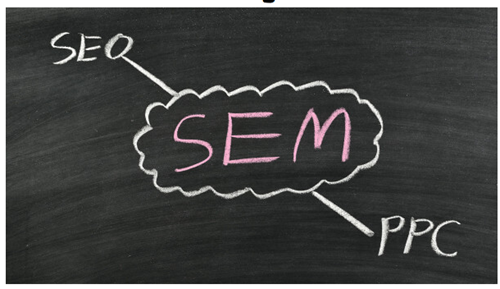
You can find out more about SEM over at Search Engine Land
6) Pay-Per-Click Advertising (PPC)
Similar to SEM, PPC advertising also describes marketing methods where the marketer will pay a predefined amount, usually known as a Bid to an advertiser to display an ad on their site that is relevant to the targeting set by the advertiser. Once an end-user completes an action which is usually a click, the advertiser then gets paid.
PPC is mostly used for retargeting ads, those ads that you see everywhere after you've visited a site and then you get served ads everywhere you go, never escaping them. It can be annoying, but damn, it's effective and has a high bounce-back rate.
PPC should sit alongside SEO & SEM in any marketing strategy you build, you can find a great beginners guide here, but be warned that PPC ads to take a lot of time in terms of setup and optimisation. It's a very competitive market so you need to be on the ball at all times.
7) Affiliate Marketing
Affiliate Marketing is the practice of recommending products or services from another company to potential customers, generating a sale and earning a commission in return. It's kind of like word-of-mouth, but paid.
The process of affiliate marketing generally involves four parties: you, an affiliate network, the advertiser and the buyer.
You upload product feeds to an affiliate network, like AWIN where third-parties such as blogs, YouTubers, social media influencers and life-hackers can apply to become an affiliate of your brand, they then pick and choose products to feature to their audience and then provide them with a link to purchase directly from your website. Behind the scenes, that link is tracked through the affiliate network and record the value of the sale and then will assign the correct commission to the advertiser.
A great example of this is those popular vloggers you see on Youtube, reviewing make-up and what not, they will provide a link to an online store to purchase and they get a cut of the sales in exchange for featuring a product to their tens of thousands or millions of viewers.
Affiliate Marketing is a great way to reach an untapped audience and is a great way to increase sales. Buyers are far more likely to purchase as it comes from a source they fully trust. Making it part of your marketing strategy is a no-brainer.
8) SMS Advertising
This is something that many people have forgotten about but proves to be very useful, if you collect mobile numbers of your customers and have permission to send them texts as a form of marketing. If you collect numbers, it's a good idea to add a box to request permission to send SMS marketing to those later down the line.
SMS Advertising is an effective way of getting instant-buys or promoting an offer by putting yourself directly in the palm of your audience. Take Dominos for example, whenever they have a good deal on, chance are you get a text and you'll then do everything in your power to convince your significant other to take the offer up and 8 times out of 10, you do. If not, you're aware of the deal and use it at a later date.

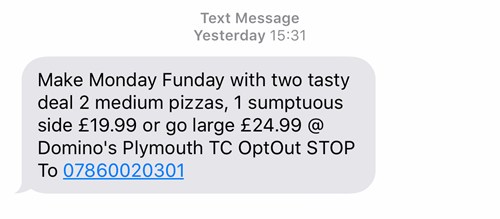
But don't overdo it, the more and more you text your customers, the more and more they become annoyed. SMS is personal, it's typically a form of communication used for conversation between friends and family. The more you text someone pushing something, the more likely they are to opt-out or even boycott your brand. Only ever use SMS when you have a captivating offer or a lightning deal.
Synposis
Digital Marketing is becoming more and more popular, with more and more devices connecting to the internet every day, the opportunities Digital can bring increase every day. Plus there is always the opportunity to go Viral which can be life-changing for local businesses, going from a small one-man band to a global business shipping worldwide overnight. Digital Marketing is a fantastic tool if you know what you're doing.
The 8 types of Digital Marketing mentioned above should feature in most, if not all of your marketing strategies for whatever products or services you are offering to the world. What's the point in having a business if your voice isn't being heard by the masses?
If you don't have the time to manage your Digital Marketing, nor have the confidence or knowledge we are here to help, get in touch with us on 01752 651414 by emailing [email protected], we'd be more than happy to help.


